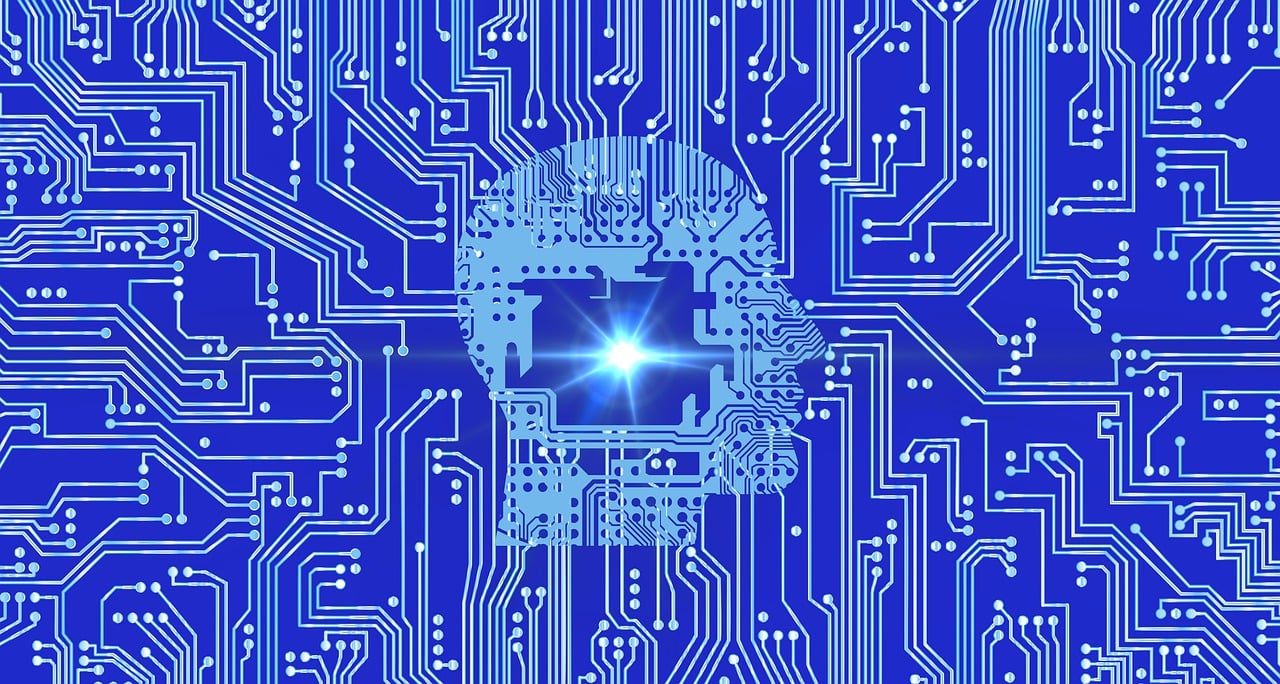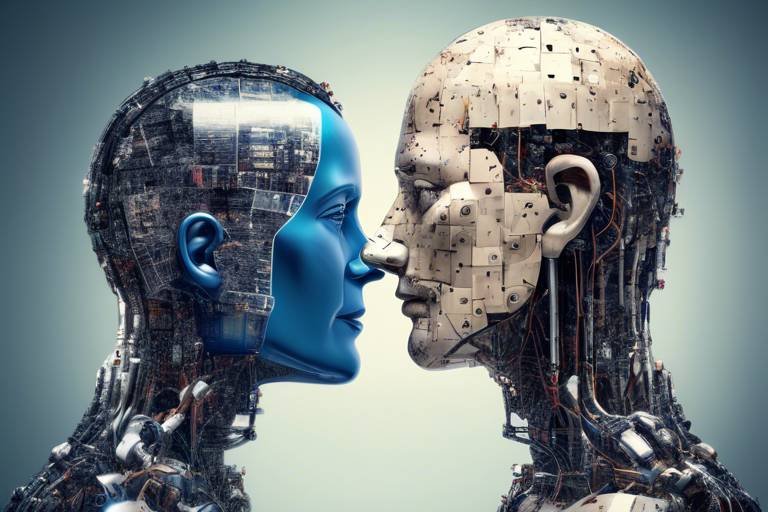Artificial Intelligence and The Philosophy of Politics
In today's rapidly evolving world, the intersection of artificial intelligence (AI) and political philosophy is more relevant than ever. As we navigate through the complexities of governance, ethical considerations, and societal impacts, it becomes increasingly clear that AI is not just a technological advancement but a transformative force in the political landscape. Imagine a world where decisions traditionally made by human leaders are increasingly influenced or even dictated by algorithms. This shift raises a plethora of questions: How do we ensure that these technologies serve the public good? Can we trust AI to make decisions that affect our lives? And what happens to the essence of democracy when machines start to play a significant role in governance?
The integration of AI into political systems offers both exciting possibilities and profound challenges. For instance, AI can enhance decision-making efficiency and improve transparency in governmental processes. Picture a scenario where data-driven insights allow leaders to make informed choices that reflect the needs and desires of their constituents. However, alongside these benefits lurk significant concerns about accountability, bias, and the very nature of human judgment. As we embrace these technologies, we must grapple with the ethical implications they bring, questioning how algorithms might perpetuate existing inequalities or create new forms of discrimination.
Moreover, the role of AI in shaping our political discourse cannot be overlooked. Social media platforms, powered by sophisticated algorithms, curate the information we consume, often leading to echo chambers that reinforce our beliefs. This phenomenon raises critical questions about the impact of AI on democratic values. Are we fostering an informed electorate, or are we merely amplifying polarization and misinformation? As we explore these dynamics, it is essential to consider how AI is reshaping electoral systems, voter engagement, and public opinion analysis. The implications are vast, and the stakes are high.
In this article, we will delve deeper into the multifaceted relationship between AI and political philosophy. From examining the ethical dilemmas posed by AI in political contexts to understanding its influence on global politics, we aim to provide a comprehensive overview of how AI is not only reshaping governance but also challenging our fundamental beliefs about democracy and society. As we embark on this exploration, we invite you to consider the profound questions that lie ahead. How will we navigate this brave new world where technology and politics intertwine? The answers may very well determine the future of our democratic institutions.
As AI technologies are increasingly integrated into government processes, they promise to enhance decision-making efficiency and transparency. Imagine a government that can analyze vast amounts of data in real-time, allowing for quicker responses to societal needs. However, this technological leap is not without its pitfalls. Concerns about accountability and bias loom large. What happens when an algorithm makes a decision that adversely affects a group of people? Who is responsible? As we explore these questions, we must also consider the potential of AI to improve public services, streamline bureaucratic processes, and foster a more engaged citizenry.
The ethical dilemmas posed by AI in political contexts are complex and multifaceted. Issues of privacy, surveillance, and the potential for algorithmic discrimination against marginalized groups must be addressed. For example, how do we protect individual rights in an age where data collection is ubiquitous? As AI systems become more prevalent in decision-making, ensuring that they operate without bias is crucial. The challenge lies in creating frameworks that hold these technologies accountable while promoting their benefits.
AI tools are reshaping electoral systems and voter engagement in ways we are only beginning to understand. With advanced data analytics, campaigns can target specific demographics with unprecedented precision. However, this capability raises ethical concerns about manipulation and misinformation. Are we enhancing democratic engagement, or are we inadvertently undermining it? The implications of AI-driven campaigning are profound, affecting not just individual elections but the very fabric of our democratic institutions.
AI-driven data analytics have a significant influence on voter behavior. By analyzing patterns and preferences, campaigns can tailor their messaging to resonate with specific audiences. This targeted approach can enhance voter engagement but also poses risks. Misinformation campaigns, fueled by AI algorithms, can distort public perception and sway election outcomes. As we reflect on these developments, we must ask ourselves: How do we safeguard the integrity of our electoral processes in an age of information overload?
The concept of algorithmic governance raises critical questions about the role of AI in policy decision-making. As systems increasingly rely on algorithms to make choices, we must confront the challenges posed to democratic accountability. How do we ensure that these decisions reflect the will of the people? The potential for AI to streamline governance is immense, but it also necessitates a careful examination of the ethical implications involved.
AI plays a pivotal role in shaping political narratives and public discourse. Social media algorithms curate the information we see, often leading to polarization and the spread of misinformation. As we navigate this landscape, we must consider the consequences of AI-generated content on our understanding of political issues. Are we fostering a culture of informed debate, or are we merely amplifying divisions? The answers to these questions will determine the trajectory of our political discourse in the digital age.
The implications of AI technology extend far beyond national borders, influencing international relations and geopolitical dynamics. Countries are leveraging AI for strategic advantages, leading to concerns about an AI arms race. As nations compete for dominance in AI capabilities, the potential for conflict and cooperation becomes increasingly complex. Understanding these dynamics is crucial for navigating the future of global politics.
The increasing use of AI in military strategies raises profound ethical questions. Autonomous weapons systems, capable of making life-and-death decisions, challenge our understanding of warfare and accountability. What are the implications for global security dynamics when machines take on roles traditionally held by humans? As we explore these issues, it is essential to consider the ethical ramifications of AI in military applications and the potential impact on international stability.
The challenges surrounding the regulation of AI at the international level are significant. Nations must navigate a landscape fraught with competition and conflict while striving for cooperation in establishing governance frameworks. How can we create regulations that ensure ethical AI development while fostering innovation? This question is central to the future of AI in global politics, as the stakes continue to rise in this rapidly evolving field.
- What is the impact of AI on democracy? AI can both enhance and undermine democratic processes, depending on how it is implemented and regulated.
- Are there ethical concerns regarding AI in politics? Yes, issues such as privacy, surveillance, and algorithmic discrimination are significant ethical dilemmas.
- How does AI influence voter behavior? AI-driven data analytics can target specific voter demographics, impacting engagement and election outcomes.
- What is algorithmic governance? Algorithmic governance refers to the use of AI systems to make policy decisions, raising questions about accountability.
- What are the implications of AI in military applications? The use of AI in military strategies raises ethical questions about autonomous weapons and global security dynamics.

The Role of AI in Governance
In today's rapidly evolving world, artificial intelligence (AI) is not just a buzzword; it's a transformative force reshaping the very fabric of governance. Imagine a scenario where decisions that once took weeks or months are made in a fraction of the time, thanks to AI technologies. Governments around the globe are increasingly recognizing the potential of AI to enhance efficiency, transparency, and responsiveness in public administration. However, this integration is not without its challenges. While AI can streamline processes and improve service delivery, it also raises significant concerns regarding accountability and potential bias.
One of the most compelling advantages of AI in governance is its ability to analyze vast amounts of data quickly. For instance, AI algorithms can process citizen feedback from various channels—social media, surveys, and public forums—allowing governments to gauge public sentiment more accurately than ever before. This leads to more informed decision-making and policies that better reflect the needs and desires of the populace. However, the reliance on algorithms can also introduce biases if not carefully managed. For example, if the data fed into these systems is skewed or unrepresentative, the outcomes can perpetuate existing inequalities.
Moreover, AI technologies can enhance transparency in governance. By automating processes such as budgeting and resource allocation, AI can provide real-time insights into government spending and project implementation. This level of transparency is crucial for building trust between citizens and their governments. Imagine being able to track how public funds are spent at the click of a button! However, this also begs the question: who is responsible when AI systems malfunction or produce erroneous results? The challenge of accountability is paramount, as it is often unclear whether the blame lies with the technology, the developers, or the policymakers who implemented these systems.
As we delve deeper into the implications of AI in governance, it is essential to consider the ethical frameworks that guide its use. Governments must establish clear guidelines and regulations to ensure that AI is deployed responsibly and equitably. This includes addressing issues such as data privacy, surveillance, and the potential for algorithmic discrimination. The balance between leveraging AI for improved governance and protecting citizen rights is a tightrope that policymakers must navigate carefully.
In conclusion, while AI holds immense promise for enhancing governance, it also presents significant challenges that must be addressed. The future of governance may very well depend on how effectively we can harness the power of AI while ensuring accountability, transparency, and ethical considerations are at the forefront of its implementation.
- How does AI improve decision-making in government? AI can analyze large datasets to provide insights that help policymakers make informed decisions quickly and effectively.
- What are the risks associated with AI in governance? Risks include potential biases in data, lack of accountability, and ethical concerns regarding privacy and surveillance.
- Can AI help with transparency in government operations? Yes, AI can automate processes and provide real-time data on government spending and project outcomes, enhancing transparency.
- What ethical guidelines should govern the use of AI in politics? Ethical guidelines should address data privacy, algorithmic discrimination, and accountability for AI-driven decisions.

Ethical Implications of AI in Politics
The integration of artificial intelligence into political spheres brings forth a myriad of ethical dilemmas that demand our attention. As we witness AI technologies becoming more prevalent in governance, it’s essential to scrutinize the implications they have on our democratic values and societal norms. One of the most pressing concerns is the issue of privacy. With AI systems capable of analyzing vast amounts of personal data, the potential for surveillance increases significantly. This raises the question: how much privacy are we willing to sacrifice for the sake of security and efficiency?
Moreover, the potential for algorithmic discrimination cannot be overlooked. AI systems, while designed to be objective, often mirror the biases present in the data they are trained on. This can lead to discriminatory practices, particularly against marginalized groups. For instance, if an AI system is used to determine eligibility for social programs, it may inadvertently favor certain demographics over others, perpetuating existing inequalities. The challenge lies in ensuring that these systems are designed with fairness and inclusivity in mind.
Another significant ethical implication is the transparency of AI algorithms. Many AI systems operate as "black boxes," meaning their decision-making processes are not easily understood. This lack of transparency can lead to a crisis of trust in political institutions. Citizens have the right to know how decisions that affect their lives are made, and when AI is involved, it becomes crucial to demystify these processes. For example, if an AI system is used to allocate public resources, the criteria and data used should be disclosed to the public to maintain accountability.
In addition to these concerns, the influence of AI on political discourse poses ethical challenges as well. AI-generated content can easily spread misinformation, leading to confusion and polarization among the electorate. The question then arises: how do we balance the benefits of AI in enhancing communication with the risks of misleading information? This is particularly critical in an age where social media platforms are the primary sources of news for many individuals.
As we navigate these complex ethical landscapes, it is vital for policymakers, technologists, and the public to engage in an ongoing dialogue about the implications of AI in politics. This conversation should aim to create a framework that ensures the responsible use of AI technologies while safeguarding the rights and freedoms of individuals. The stakes are high, and the path forward must be paved with careful consideration of the ethical dimensions involved.
- What are the main ethical concerns surrounding AI in politics? The main concerns include privacy, algorithmic discrimination, transparency, and the influence of AI on political discourse.
- How can AI lead to discrimination? AI systems can replicate biases found in their training data, leading to unfair treatment of certain groups.
- Why is transparency important in AI decision-making? Transparency is crucial for building trust and accountability, allowing citizens to understand how decisions affecting their lives are made.
- What role does AI play in spreading misinformation? AI-generated content can amplify false information, contributing to confusion and polarization in political discussions.

AI and Democratic Processes
In recent years, the integration of artificial intelligence into democratic processes has sparked a significant transformation in how electoral systems operate. Imagine a world where technology not only assists in decision-making but also shapes the very foundation of democracy itself. AI tools are increasingly being utilized to analyze voter behavior, predict election outcomes, and even streamline the voting process, making it more efficient. However, this technological advancement comes with a double-edged sword, raising critical questions about the implications for democratic values.
One of the key areas where AI is making waves is in voter engagement. Through sophisticated data analytics, political campaigns can now tailor their messages to resonate with specific demographics. For instance, AI algorithms can analyze social media interactions, online behavior, and even demographic data to craft personalized campaign messages that speak directly to individual voters. This targeted approach can significantly enhance voter turnout, as people feel more connected to candidates who address their unique concerns. But, does this create a more informed electorate, or does it risk oversimplifying complex issues into bite-sized, easily digestible sound bites?
Furthermore, the role of AI in analyzing public opinion has become a game changer. By processing vast amounts of data from various sources, AI can gauge the mood of the electorate in real-time. This capability allows political parties to adjust their strategies on the fly, responding to public sentiment almost instantaneously. However, this raises ethical dilemmas regarding the manipulation of public opinion. Are voters truly making informed choices, or are they being subtly guided by algorithms that prioritize engagement over truth?
Another critical aspect is the potential for algorithmic governance, which refers to the use of AI systems to make policy decisions. While this might sound efficient, it poses substantial challenges to democratic accountability. How can we ensure that these algorithms are transparent and free from bias? The risk of algorithmic discrimination looms large, especially for marginalized groups who may already face systemic inequalities. If AI systems are trained on biased data, they could perpetuate those biases in political decision-making, leading to unfair outcomes.
In light of these complexities, it’s essential to consider how AI can both enhance and undermine democratic processes. On one hand, it can increase efficiency and engagement, but on the other, it risks eroding the very principles of democracy. As we navigate this uncharted territory, it’s crucial for policymakers to strike a balance between leveraging AI’s capabilities and safeguarding democratic values. The challenge lies in ensuring that technology serves the public good, rather than becoming a tool for manipulation.
To summarize, the integration of AI into democratic processes is a double-edged sword that requires careful consideration. While it holds the potential to enhance voter engagement and streamline electoral systems, it also poses significant ethical challenges and risks undermining accountability. As we move forward, the dialogue surrounding AI in politics must continue, ensuring that technology is used responsibly and equitably.
- How does AI influence voter engagement? AI analyzes data to create tailored messages that resonate with specific voter demographics.
- What are the risks of algorithmic governance? AI systems can perpetuate biases present in their training data, leading to unfair policy decisions.
- Can AI improve democratic processes? Yes, AI can enhance efficiency and engagement but must be balanced with ethical considerations.

Impact on Voter Behavior
The impact of artificial intelligence on voter behavior is nothing short of revolutionary. Imagine walking through a crowded marketplace where every stall is tailored to your tastes; this is how AI operates in the political arena. By analyzing vast amounts of data, AI can predict what voters want, often before they even know it themselves. This capability allows political campaigns to craft messages that resonate deeply with specific demographics, leading to a more personalized and, arguably, manipulative approach to political engagement.
For instance, consider the way AI-driven algorithms can analyze social media interactions, search histories, and even public sentiments to determine the most effective messaging strategies. Campaigns can deploy targeted advertisements that speak directly to the concerns and interests of individual voters. This raises an intriguing question: Are voters truly making informed decisions, or are they being subtly guided toward choices that align with the interests of those in power?
Moreover, the phenomenon of micro-targeting has become a contentious issue. While it allows campaigns to reach specific groups with tailored messages, it also risks creating echo chambers, where voters are only exposed to information that reinforces their existing beliefs. This can lead to heightened polarization, as individuals become less likely to encounter differing viewpoints. The implications are profound: if voters are only hearing what they want to hear, how can they make informed choices that reflect the collective will of the populace?
To illustrate the potential consequences of AI on voter behavior, consider the following table that contrasts traditional campaigning methods with AI-driven strategies:
| Aspect | Traditional Campaigning | AI-Driven Campaigning |
|---|---|---|
| Message Delivery | One-size-fits-all | Highly personalized |
| Voter Engagement | Broad outreach | Targeted interactions |
| Feedback Loop | Delayed response | Real-time adjustments |
| Information Exposure | Diverse perspectives | Potential echo chambers |
As we delve deeper into the implications of AI on voter behavior, we must also consider the ethical ramifications. The use of AI can inadvertently lead to algorithmic discrimination, where certain groups are unfairly targeted or neglected based on biased data. This raises critical questions about fairness and equity in the electoral process. Are we inadvertently reinforcing existing inequalities by allowing algorithms to dictate who gets heard and who doesn’t?
Ultimately, the intersection of AI and voter behavior presents a double-edged sword. On one hand, we have the potential for more engaged and informed voters, thanks to personalized outreach and data-driven insights. On the other hand, we face the risk of manipulation, polarization, and discrimination. As we navigate this complex landscape, it is essential to foster an ongoing dialogue about the ethical use of AI in politics, ensuring that technological advancements serve the democratic process rather than undermine it.
- How does AI influence political campaigns? AI analyzes voter data to tailor messages, enhancing engagement but also raising ethical concerns.
- What are the risks of micro-targeting in elections? Micro-targeting can create echo chambers, limiting exposure to diverse viewpoints and increasing polarization.
- Can AI lead to algorithmic discrimination? Yes, biased data can result in certain groups being unfairly targeted or ignored in political messaging.
- How can we ensure ethical AI use in politics? Ongoing dialogue and regulation are essential to ensure AI benefits the democratic process.

Algorithmic Governance
In today's digital age, the concept of is gaining traction as governments explore the potential of artificial intelligence to enhance policy-making and administrative efficiency. But what does this really mean for democracy and accountability? Imagine a world where decisions about public policies are made not by human officials, but by algorithms that analyze vast amounts of data to predict outcomes. While this might sound like a futuristic utopia, it raises significant concerns about transparency and the potential for bias.
Algorithmic governance relies on the use of AI systems to process data and make recommendations or decisions. This can lead to improved efficiency in areas such as resource allocation, traffic management, and even public health responses. For instance, cities are increasingly using AI to optimize traffic flow, which can significantly reduce congestion and pollution. However, the implementation of these systems is not without its challenges. One of the most pressing issues is the lack of accountability in decision-making processes. When an algorithm makes a decision, who is responsible for the outcome? Is it the programmer, the government, or the algorithm itself?
Moreover, the potential for algorithmic bias is a significant concern. If the data fed into these systems is biased or incomplete, the outcomes can perpetuate existing inequalities. For example, if an algorithm is used to determine eligibility for social services, it may inadvertently disadvantage marginalized communities if the data reflects historical biases. This raises ethical questions about the fairness and justice of decisions made by machines.
As we navigate the complexities of algorithmic governance, it is crucial to consider the implications for democratic accountability. Traditional governance relies on human judgment and the ability to hold officials accountable through voting and public discourse. In contrast, algorithms operate in a black box, often making it difficult for citizens to understand how decisions are made. To address these challenges, some experts advocate for the development of transparency frameworks that allow for greater scrutiny of algorithmic decision-making processes. This could involve documenting the data sources, algorithms used, and the rationale behind decisions.
Furthermore, the integration of AI in governance necessitates a shift in how we think about public participation. Citizens should be engaged in discussions about the design and implementation of these systems to ensure that their voices are heard. This can be achieved through public consultations, workshops, and inclusive policy-making processes that prioritize community input.
In conclusion, while algorithmic governance offers exciting possibilities for enhancing public administration, it is essential to approach it with caution. By addressing issues of accountability, bias, and public engagement, we can harness the power of AI to create a more equitable and effective governance model. As we move forward, the challenge will be to strike a balance between leveraging technology for efficiency and maintaining the core democratic values that underpin our societies.
- What is algorithmic governance? Algorithmic governance refers to the use of AI systems to make decisions or recommendations in public policy and administration.
- What are the risks associated with algorithmic governance? Risks include lack of accountability, potential bias in decision-making, and challenges to transparency.
- How can we ensure accountability in algorithmic governance? Developing transparency frameworks and engaging citizens in the decision-making process are essential steps.
- What role does public participation play in algorithmic governance? Public participation ensures that community voices are included in the design and implementation of AI systems, promoting fairness and equity.

AI's Influence on Political Discourse
Artificial Intelligence is not just a buzzword; it's a transformative force reshaping the very fabric of political discourse. Imagine a world where algorithms sift through mountains of data to curate news feeds, shaping not only what we see but also what we believe. This is the reality we find ourselves in today. AI's ability to analyze vast amounts of information allows it to influence political narratives in profound ways, often without us even realizing it.
One of the most significant impacts of AI on political discourse is its role in social media algorithms. These algorithms determine which posts appear on our feeds, often prioritizing content that is sensational or emotionally charged. This can create echo chambers, where users are exposed primarily to viewpoints that align with their own, reinforcing existing beliefs and polarizing political opinions. As a result, the diversity of thought that is essential for a healthy democracy can be stifled.
Moreover, AI-generated content is becoming increasingly prevalent. From news articles to opinion pieces, AI can produce text that mimics human writing with alarming accuracy. While this technology can be used to disseminate information quickly, it also raises concerns about misinformation and the authenticity of the content we consume. For instance, deepfake technology can create hyper-realistic videos that misrepresent political figures or events, further complicating our understanding of truth in political discourse.
In addition to shaping what we see, AI also plays a crucial role in analyzing public sentiment. By utilizing natural language processing, AI can gauge the mood of the public based on social media interactions, comments, and other online activities. This data can be invaluable for political campaigns, allowing them to tailor their messages to resonate with specific demographics. However, this raises ethical questions about manipulation and the extent to which voters can be influenced by targeted messaging.
As we navigate this complex landscape, it is essential to consider the broader implications of AI on our political systems. Are we allowing technology to dictate our discourse? Are we becoming passive consumers of information, rather than active participants in democracy? These questions are critical as we explore the intersection of AI and politics.
To further illustrate the impact of AI on political discourse, consider the following table that outlines key areas of influence:
| Area of Influence | Description |
|---|---|
| Social Media Algorithms | Curate content based on user behavior, often reinforcing existing beliefs. |
| AI-Generated Content | Creates realistic text and media, raising concerns about misinformation. |
| Public Sentiment Analysis | Gauges public mood to inform political campaigns and strategies. |
In conclusion, the influence of AI on political discourse is multifaceted and complex. As we continue to integrate AI technologies into our daily lives, it is crucial to remain vigilant about their implications for democracy. The challenge lies in harnessing the power of AI while ensuring that it serves to enhance, rather than diminish, the quality of political discourse.
- How does AI affect political polarization? AI can create echo chambers by curating content that aligns with users' existing beliefs, thereby reinforcing polarization.
- What are the risks of AI-generated content? AI-generated content can spread misinformation and blur the lines between real and fabricated information, complicating public understanding.
- Can AI improve democratic engagement? While AI can enhance voter engagement through targeted messaging, it also raises ethical concerns about manipulation and authenticity.

AI and Global Politics
As we navigate the complexities of the 21st century, the role of Artificial Intelligence (AI) in global politics is becoming increasingly prominent. Nations are not merely passive observers of this technological wave; they are actively leveraging AI to gain strategic advantages on the international stage. The implications of this trend are profound, as AI reshapes diplomatic relations, economic power dynamics, and even military strategies. But what does this mean for the future of global governance and international cooperation?
One of the most significant impacts of AI on global politics is the potential for an AI arms race. Just as the Cold War saw nations racing to develop nuclear capabilities, we are now witnessing a similar race in the realm of AI. Countries like the United States and China are investing heavily in AI research and development, aiming to secure a technological edge that could translate into military superiority and economic dominance. This competition raises the stakes, as nations strive to outdo each other in developing advanced AI systems capable of everything from autonomous drones to sophisticated cyber warfare tools.
Moreover, the integration of AI into military applications is not just about hardware; it also involves complex ethical considerations. The deployment of autonomous weapons systems brings forth questions about accountability and the moral implications of machines making life-and-death decisions. Imagine a scenario where a drone, equipped with AI, autonomously decides to engage a target without human intervention. Who is responsible for that decision? The programmer? The military commander? Or is it the machine itself? These dilemmas are not merely academic; they have real-world consequences that could redefine the rules of engagement in warfare.
In addition to military applications, AI is also reshaping the landscape of international diplomacy. Countries are using AI to analyze vast amounts of data, allowing them to better understand global trends, public sentiment, and even potential threats. This data-driven approach can enhance diplomatic strategies and improve decision-making processes. However, this reliance on AI also poses risks, particularly regarding privacy and surveillance. Nations could misuse AI technologies to monitor their citizens or to conduct espionage against rivals, leading to heightened tensions and a breakdown of trust in international relations.
As we look at the global implications of AI, it is essential to consider the need for international regulation. With AI technology evolving at a breakneck pace, the absence of a cohesive regulatory framework poses significant challenges. Countries must collaborate to establish guidelines that govern the ethical use of AI in military and civilian applications. This cooperation is crucial to prevent a chaotic landscape where nations act unilaterally, potentially leading to conflict. The establishment of international norms and agreements regarding AI usage is not just beneficial; it is necessary for maintaining global stability.
In conclusion, the intersection of AI and global politics is a double-edged sword. While it offers opportunities for enhanced security and improved diplomatic relations, it also presents significant challenges that require careful navigation. As we continue to explore the implications of AI on the world stage, one thing is clear: the future of international relations will be profoundly shaped by the choices we make today regarding this transformative technology.
- What are the main risks associated with AI in global politics?
AI poses risks such as an arms race, ethical dilemmas surrounding autonomous weapons, and potential misuse for surveillance and privacy violations. - How can countries collaborate on AI regulation?
Countries can establish international agreements and frameworks that set guidelines for the ethical use of AI in both military and civilian contexts. - What role does AI play in military strategies?
AI is increasingly used to develop autonomous systems and enhance data analysis for strategic decision-making in military operations. - Can AI improve diplomatic relations?
Yes, AI can analyze data to better understand global trends and public sentiment, potentially leading to more informed diplomatic strategies.

AI in Military Applications
Artificial Intelligence is rapidly transforming the landscape of military operations, introducing a wave of innovation that has the potential to redefine how nations engage in warfare and defense strategies. The integration of AI technologies into military applications is not just about enhancing capabilities; it raises profound ethical questions and concerns about global security. Imagine a battlefield where decisions are made not by human commanders but by algorithms that analyze vast amounts of data in real-time. This shift could lead to unprecedented efficiencies, but it also poses significant risks.
One of the most compelling aspects of AI in military applications is the development of autonomous weapons systems. These systems can operate without direct human intervention, relying on machine learning algorithms to make decisions about targeting and engagement. While proponents argue that such technologies can reduce human casualties and improve operational effectiveness, critics warn of the potential for catastrophic mistakes. The question arises: who is accountable when an autonomous drone mistakenly targets civilians? This dilemma highlights the urgent need for clear ethical guidelines and accountability frameworks in the deployment of AI in military contexts.
Furthermore, AI is also playing a crucial role in intelligence gathering and analysis. Modern militaries utilize AI to sift through massive datasets, identifying patterns and insights that would be impossible for human analysts to discern. For instance, AI can analyze satellite imagery to detect troop movements or predict potential conflict zones based on historical data. This capability not only enhances situational awareness but also allows for more strategic planning and resource allocation. However, the reliance on AI for intelligence raises concerns about privacy and surveillance, as well as the potential for bias in data interpretation.
To give you a clearer picture of how AI is currently being utilized in military applications, consider the following table:
| AI Application | Description | Potential Benefits | Risks |
|---|---|---|---|
| Autonomous Weapons | Weapons systems that can operate without human control. | Reduced human casualties, faster response times. | Accountability issues, risk of civilian casualties. |
| Intelligence Analysis | Using AI to analyze data for military intelligence. | Enhanced situational awareness, improved decision-making. | Privacy concerns, potential bias in data. |
| Logistics Optimization | AI systems that manage supply chains and resource allocation. | Increased efficiency, cost savings. | Over-reliance on technology, vulnerability to cyber attacks. |
The landscape of military applications of AI is not only about efficiency and effectiveness; it is also about the moral implications of using such technologies. As we venture further into this new era of warfare, it becomes imperative for policymakers, military leaders, and ethicists to engage in a dialogue about the responsibilities that come with these powerful tools. The potential for an AI arms race looms large, as countries race to develop more advanced military technologies. This scenario could lead to heightened tensions and instability in international relations, making it crucial for nations to cooperate on establishing norms and regulations governing the use of AI in military contexts.
In conclusion, while AI offers remarkable opportunities to enhance military capabilities, it also brings with it a host of ethical and strategic challenges that cannot be overlooked. As we stand on the brink of this technological revolution, it is essential to ensure that the deployment of AI in military applications is guided by principles that prioritize human rights, accountability, and global stability.
- What are autonomous weapons? Autonomous weapons are military systems that can operate independently of human control, using AI to make decisions about targeting and engagement.
- How does AI enhance military intelligence? AI can analyze vast amounts of data quickly, identifying patterns and insights that help military leaders make informed decisions.
- What are the ethical concerns surrounding AI in the military? Key concerns include accountability for decisions made by AI systems, potential civilian casualties, and privacy issues related to surveillance.
- Is there a risk of an AI arms race? Yes, as countries develop advanced military AI technologies, there is a potential for increased tensions and competition on a global scale.

International Regulation of AI
As artificial intelligence continues to evolve at a breakneck pace, the need for international regulation becomes increasingly critical. Countries around the globe are grappling with the implications of AI technologies, from ethical concerns to national security risks. The challenge lies in creating a cohesive framework that can be adopted universally while respecting each nation's sovereignty and unique political landscape.
Currently, there is a patchwork of regulations that vary significantly from one country to another. For instance, the European Union has been at the forefront of AI regulation, proposing comprehensive guidelines aimed at ensuring transparency, accountability, and fairness in AI applications. These guidelines emphasize the importance of human oversight, particularly in high-risk AI systems. In contrast, the United States has taken a more laissez-faire approach, focusing on innovation and market-driven solutions, which raises concerns about oversight and ethical standards.
One of the major hurdles in international AI regulation is the divergence of interests among nations. Developed countries often prioritize ethical considerations and human rights, while developing nations may focus on leveraging AI for economic growth and technological advancement. This divergence can lead to conflicts in regulatory approaches, making it difficult to establish a unified set of standards. Furthermore, the rapid pace of AI development often outstrips the ability of regulatory bodies to keep up, resulting in outdated or ineffective regulations.
To address these challenges, international cooperation is essential. Organizations such as the United Nations and the OECD are beginning to facilitate dialogues among member nations to develop shared principles on AI governance. These discussions aim to create a framework that balances innovation with ethical considerations while ensuring that AI technologies benefit humanity as a whole. However, achieving consensus is no easy feat, as nations must navigate their own political landscapes and public sentiments.
Moreover, the emergence of an AI arms race poses additional complications for international regulation. As countries invest heavily in AI for military applications, the potential for misuse and escalation of conflicts increases. This scenario underscores the urgent need for treaties and agreements similar to those established for nuclear weapons. Countries must come together to discuss not only the ethical implications of AI but also the security risks associated with its military applications.
In conclusion, the path toward effective international regulation of AI is fraught with challenges but is essential for ensuring that the technology is developed and deployed responsibly. As nations continue to navigate these complexities, the hope is that a collaborative approach will emerge, fostering a global environment where AI can thrive while safeguarding human rights and promoting peace.
- What is the current state of AI regulation globally?
Regulations vary widely, with some countries like the EU proposing comprehensive guidelines, while others, like the US, are more focused on innovation without stringent oversight. - Why is international cooperation important for AI regulation?
International cooperation is crucial to harmonize regulations, address ethical concerns, and prevent an AI arms race among nations. - What are the risks associated with AI in military applications?
The risks include potential misuse, escalation of conflicts, and ethical dilemmas surrounding autonomous weapons. - How can countries balance innovation with ethical considerations in AI?
Countries can work together to develop shared principles that promote responsible AI development while encouraging innovation.
Frequently Asked Questions
- What is the role of AI in governance?
AI plays a significant role in enhancing governance by improving decision-making processes, increasing efficiency, and promoting transparency. Governments are increasingly relying on AI technologies to analyze data, predict outcomes, and streamline operations. However, this integration also raises concerns about accountability and the potential for bias in AI systems.
- What are the ethical implications of AI in politics?
The ethical implications of AI in politics include issues related to privacy, surveillance, and algorithmic discrimination. As AI systems become more prevalent, there are growing concerns about how they might infringe on individual rights and disproportionately affect marginalized groups. These dilemmas challenge us to consider the balance between technological advancement and ethical governance.
- How does AI affect democratic processes?
AI is reshaping democratic processes by influencing electoral systems, voter engagement, and public opinion analysis. While AI tools can enhance voter outreach and participation, they also have the potential to undermine democratic values through targeted misinformation campaigns and manipulation of public sentiment.
- What is algorithmic governance?
Algorithmic governance refers to the use of AI systems to make policy decisions. This approach can increase efficiency but poses significant challenges to democratic accountability. As algorithms take on more decision-making power, it becomes crucial to ensure that these systems are transparent and fair.
- How does AI influence political discourse?
AI significantly influences political discourse by shaping the narratives we see on social media and other platforms. Algorithms determine which content gets visibility, often leading to polarization and echo chambers that can distort public understanding and debate.
- What are the implications of AI in global politics?
AI technology has far-reaching implications for international relations, as countries leverage it for strategic advantages. This can lead to an AI arms race, where nations compete to develop superior technologies, raising concerns about global security and stability.
- How is AI being used in military applications?
AI is increasingly being integrated into military strategies, raising ethical questions about the use of autonomous weapons and their impact on warfare. The deployment of AI in military contexts necessitates a thorough examination of the ethical ramifications and the potential risks to global security.
- What challenges exist regarding international regulation of AI?
The regulation of AI at the international level presents numerous challenges, including the need for cooperation among nations and the potential for conflict over governance frameworks. As AI technology evolves, establishing effective regulations that promote safety and ethical standards becomes increasingly complex.



















